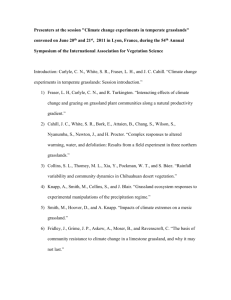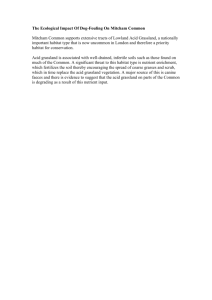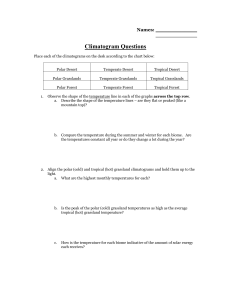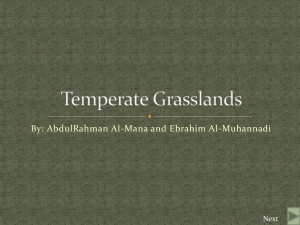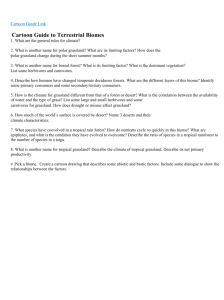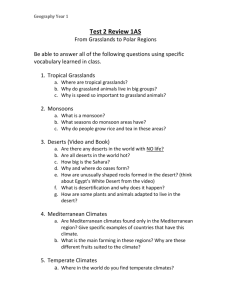Temperate Grasslands
advertisement
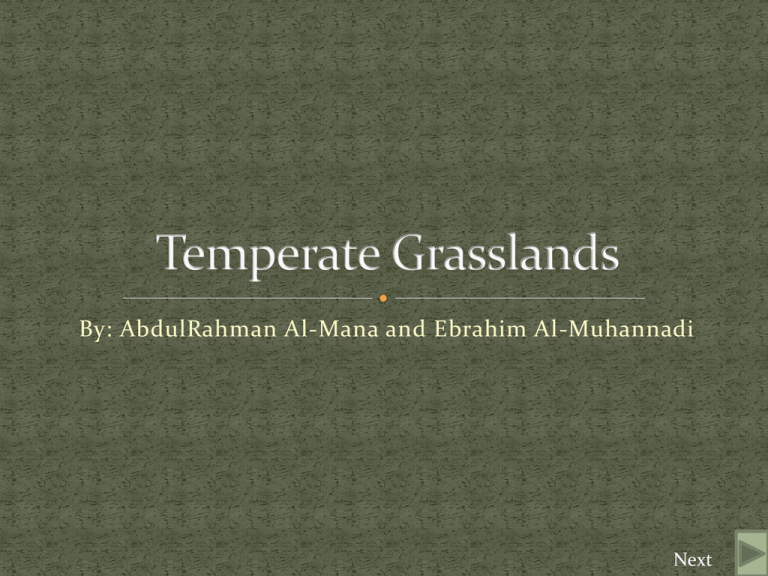
By: AbdulRahman Al-Mana and Ebrahim Al-Muhannadi Next About a quarter of the world is grasslands, every continent has a grassland, except the Artic and Antarctic. In the summer it’s really hot and in the winter it’s cold. Grasslands are covered in grasses, herbs and flowers. ("Buzzle Web Portal: Intelligent Life on the Web") The Grasslands here are some temperate prairies: North American Prairies, South American Pampas, Eurasian Steppe and South American Veld. (Whitfield, Moore, and Cox 70-71) Prev. Next http://packerpedia.wiki.packer.edu/file/view/ 34_14TemperateGrassland_CNL.jpe/31115653/3 4_14TemperateGrassland_CNL.jpe Picture of Buffalo eating Grass http://seoeun01px2009.files.wordpress.com/ 2007/10/buffalo-grass3.jpg / Temperate Prairies Prev. Next 50% of the grasslands are covered in grass the rest are forbs (forbs is a shortened word for “Euphorbiaceae”.) These are some species of grasses and forbs: Grey-Headed Cone, Lupines, Milkweed, Big Blue stem, Broom Sedge, Prairie Cord Grass, Indian Grass and Ironweed. ("Grassland habitat") Trees can’t grow because of the lack of moisture, but flowers can grow because of the fast decay of humus, which lets out nutrients for them. ("Grassland") Prev. Next http://www.hamiltonnature.org/habitats/habi tat_images/Prairie-Grass-Photo-1.jpg / Grey-Headed Coneflowers (http://www.hamiltonnature.org/habitats/habitat_ images/Wild-Bergamot.jpg/ Wild Bergamot Prev. Next Types of Animals: Mammals, Insects and Birds Behavioral and Physical Adaptations Female Coyotes give birth in Spring and can have up to 5 or 6 pups. Coyotes have great hearing when they can hear every step of their prey and when they sense danger they run straight away. The Bald Eagle can put it’s large nests on trees, ground and cliffs. These eagles will also change their nutrients depending on where they live. The Prairie Dogs live in burrows called towns . They leave 2 open holes for running away and for air. Also they don’t like really small places either because they can’t see if they’re in danger or not. (“Blue Planet Biome”) Prev. Next Some Large Mammals: Cheetah, Elk, Coyote, The “Big Horn” Sheep and Leopards. Some small mammals: Swift Fox, Bush Dog, Pouched Mouse, European snow vole, Doe, Buck, Iranian jerboa, Alai mole vole, Highveld gerbil, Common long-nosed armadillo and Steppe pika. Some animals like the African Elephant in the Temperate Grassland Migrate during the winter because it gets really cold. ("Temperate Grassland Animals") Prev. Next African Elephant http://thewebsiteofeverything.com/img/Afr ican_elephant.JPG Swift Fox http://thewebsiteofeverything.com/img/swi ft_fox.jpg Prev. Next Most common birds that live in the temperate prairies like Quails migrate during the cold seasons to more warmer places then in the warm season they come back. The most common insect is the bumble bees, ants, crickets, grass hoppers and mosquitoes. ("Absolute Astronomy") Some Omnivores (Meat and Herb eater), while eating the grass they will eat the insects with them, insects like grasshoppers and crickets. These insects give them nutrients. Prev. Next The Bald Eagle http://homepage.mac.com/wildlifeweb/bir d/bald_eagle/bald_eagle_06tk.jpg Bumble Bee http://www.eduwebs.org/bugs/bumble_bee. jpg Prev. Next The climate in winter goes below 18oC in parts of the places while in the summer it can reach above 32oC. (Bailey) The rain in in the temperate grasslands don’t come often as the tall-grass prairies. That’s why the grasses are short The soil is deep and dark very fertile lot’s of nutrients which allows lots of plants to grow but trees don’t grow because of the lack of moisture.(Webber) Prev. Next People their take the good land for farming. I think it’s bad because it leaves less space for the animals to live in and if they take all the good space the animals can’t eat anymore which would lead to animals extinct. . (ID1276710947) People Farming http://webpages.scu.edu/ftp/eching/im ages/farm_work.jpg • Also hunting has been a major issue people hunted elephants for tusks also lions and bison for their meat and also to go to the zoo. This can lead animal extinct. ("Grassland") Prev. Next http://www.deepcreektimes.com/kids/world_grasslands_map.jpg Prev. Next 1.("Buzzle Web Portal: Intelligent Life on the Web"): "Grassland Biome: Animals and Plants." Buzzle Web Portal: Intelligent Life on the Web. N.p., n.d. Web. 10 Mar 2010. <http://www.buzzle.com/articles/grassland-biome-animals-andplants.html>. 2.(Whitfield, Moore, and Cox 70-71): Whitfield, Philip, Peter Moore, and Barry Cox. "Temperate grassland." Macmillan Reference USA, Print. 3.(“Blue Planet Biome”) :"Prairie Animal Page." Blue Planet Biomes. Web. 14 Mar. 2010. <http://www.blueplanetbiomes.org/prairie_animal_page.htm>. 4. ("Grassland habitat") :"Grassland Plants." Grassland habitat. Habitats of Hamilton and Halton, n.d. Web. 15 Mar 2010. <http://www.hamiltonnature.org/habitats/grasslands/grass_plants.htm>. 5. (Webber):Webber, Charles. "The grassland biome." University of California Museum of Paleontology. California Academy of Sciences., 2002. Web. 17 Mar 2010. <http://www.ucmp.berkeley.edu/exhibits/biomes/grasslands.php>. Prev. Next 6.("Grassland") :"Animals and Plants in Temperate Grassland." Grassland. ThinkQuest team, n.d. Web. 15 Mar 2010. <http://library.thinkquest.org/26634/grass/Temperate/animal.htm>. 7. ("Temperate Grassland Animals"):"Temperate Grassland Animals." Temperate Grassland Animals. TheWebsiteOfEverything.com, 2010. Web. 16 Mar 2010. <http://thewebsiteofeverything.com/habitats/Temperate_Grassland.html>. 8. ("Absolute Astronomy") : "Grassland." Absolute Astronomy. AbsoluteAstronomy.com, 2010. Web. 16 Mar 2010. <http://www.absoluteastronomy.com/topics/Grassland>. 9.(Bailey): Bailey, Regina. "Land Biomes: Temperate Grasslands." About.com:Biology. About.com, n.d. Web. 17 Mar 2010. <http://biology.about.com/od/landbiomes/a/aa042106a.htm>. 10. (ID1276710947): ID1276710947, . "How do humans effect grassland?." Online Posting to WikiAnswers. Web. 17 Mar 2010. 11. ("Grassland") : "Human Impacts on Grassland." Grassland. ThinkQuest team, 1999. Web. 17 Mar 2010. <http://library.thinkquest.org/26634/grass/impact.htm>. Prev. From the Beginning
